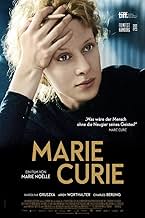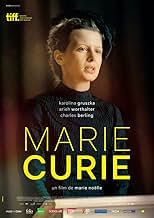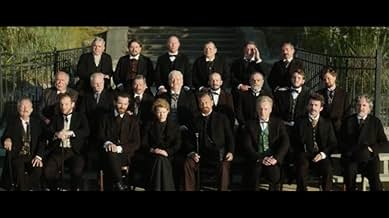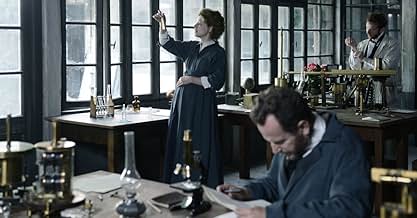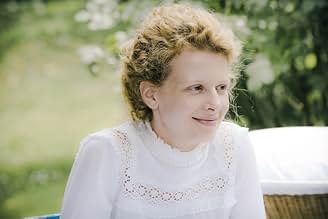IMDb-BEWERTUNG
5,6/10
1657
IHRE BEWERTUNG
Der Film handelt vom Leben der berühmten Physikerin und Chemikerin Marie Curie und ihrem Kampf, sich in der von Männern dominierten wissenschaftlichen Gemeinschaft zu Anfang des 20. Jahrhund... Alles lesenDer Film handelt vom Leben der berühmten Physikerin und Chemikerin Marie Curie und ihrem Kampf, sich in der von Männern dominierten wissenschaftlichen Gemeinschaft zu Anfang des 20. Jahrhunderts in Frankreich durchzusetzen.Der Film handelt vom Leben der berühmten Physikerin und Chemikerin Marie Curie und ihrem Kampf, sich in der von Männern dominierten wissenschaftlichen Gemeinschaft zu Anfang des 20. Jahrhunderts in Frankreich durchzusetzen.
- Auszeichnungen
- 4 Gewinne & 8 Nominierungen insgesamt
Izabela Kuna
- Bronia
- (as Iza Kuna)
Empfohlene Bewertungen
I found the film interesting. I generally knew about Maria Skłodowska-Curie (she was a Pole, born and raised in Warsaw). I knew nothing about her personal life in Paris, which is the focus of this film.
The film looks more at her personal life and the large challenges she faced being a woman (and mother of two) in a Man's World. Worth seeing.
The film looks more at her personal life and the large challenges she faced being a woman (and mother of two) in a Man's World. Worth seeing.
Marie Curie: The Courage of Knowledge (2016) is a Polish/French film co-written and directed by Marie Noelle
The wonderful Polish actor Karolina Gruszka stars as Marie Curie. Charles Berling portrays Pierre Curie, and Arieh Worthalter plays Paul Langevin, a married scientist with whom Marie had an affair.
If you're looking for a movie that explains Marie Curie's discoveries, and how she arrived at them, this isn't that film. If you're looking for a movie that portrays Marie Curie as a brilliant scientist, and a young widow that does, indeed, have an affair, this is that film.
This movie portrays the plight of women scientists in the early 20th Century. Male scientists simply wouldn't accept the fact that a woman could be a brilliant scientist. We know that Marie Curie was brilliant--she won two Nobel prizes. The scientists of her day must have known that she was brilliant, but it was easy to ignore this fact because she was a woman. Think of how many frustrated women lived their lives with their intellect undiscovered. Think of the great minds that were lost to science. These are not happy thoughts, but they reflect reality.
I enjoyed this movie. We had seen Karolina Gruszka in another Polish movie--The Happiness of the World. She is a brilliant actor. Directors love to photograph Gruszka getting into and out of her bath. Who can blame them? (She must be the cleanest actor in Poland.)
For whatever reason, this film has a ghastly IMDb rating of 5.9. This is one of those situations where I say, "Did they see the same film I saw?" It's not a perfect movie, but it's a very good one.
We saw the film at Rochester's excellent Little Theatre, as part of the great Rochester Polish Film Festival . It will work well on the small screen. My advice--ignore the IMDb rating and watch this movie. I think you won't be disappointed.
The wonderful Polish actor Karolina Gruszka stars as Marie Curie. Charles Berling portrays Pierre Curie, and Arieh Worthalter plays Paul Langevin, a married scientist with whom Marie had an affair.
If you're looking for a movie that explains Marie Curie's discoveries, and how she arrived at them, this isn't that film. If you're looking for a movie that portrays Marie Curie as a brilliant scientist, and a young widow that does, indeed, have an affair, this is that film.
This movie portrays the plight of women scientists in the early 20th Century. Male scientists simply wouldn't accept the fact that a woman could be a brilliant scientist. We know that Marie Curie was brilliant--she won two Nobel prizes. The scientists of her day must have known that she was brilliant, but it was easy to ignore this fact because she was a woman. Think of how many frustrated women lived their lives with their intellect undiscovered. Think of the great minds that were lost to science. These are not happy thoughts, but they reflect reality.
I enjoyed this movie. We had seen Karolina Gruszka in another Polish movie--The Happiness of the World. She is a brilliant actor. Directors love to photograph Gruszka getting into and out of her bath. Who can blame them? (She must be the cleanest actor in Poland.)
For whatever reason, this film has a ghastly IMDb rating of 5.9. This is one of those situations where I say, "Did they see the same film I saw?" It's not a perfect movie, but it's a very good one.
We saw the film at Rochester's excellent Little Theatre, as part of the great Rochester Polish Film Festival . It will work well on the small screen. My advice--ignore the IMDb rating and watch this movie. I think you won't be disappointed.
This is sadly not a film about a great woman who dedicated her life to science and paid the ultimate price in doing so. Rather it is simply yet another tedious promotion of today's feminist agenda telling us how terrible it was to be a woman in the past and (indirectly) how much we must strive to strengthen women's rights in the future. Marie Curie is simply the canvas used to restate this message for the millionth time.
It tells us nothing about her background, her early interests, her historical meeting with Pierre Curie or even the substance of the relationship between them. And most awful of all it tells us nothing of her actual work, how it was that Radium and Polonium were discovered and how this was received at the time.
Instead the film concentrates upon a series of soft porn, soft focus and heavily romantacised encounters between her and a married man whom she partnered after Pierre's death. Curie was then 44 and fairly full figured after having two daughters. But the actress in the film is nothing like that. She has a slim lithe body with perfectly neat compact breasts that would emulate a teenager. In short the woman who partnered a man becuase of shared scientific exploration is now displayed as a sex godess worthy of our admiration on physical grounds alone.
Do youself a favour. Chuck this film in the bin and watch the 1943 version instead. It is much much more rewarding.
It tells us nothing about her background, her early interests, her historical meeting with Pierre Curie or even the substance of the relationship between them. And most awful of all it tells us nothing of her actual work, how it was that Radium and Polonium were discovered and how this was received at the time.
Instead the film concentrates upon a series of soft porn, soft focus and heavily romantacised encounters between her and a married man whom she partnered after Pierre's death. Curie was then 44 and fairly full figured after having two daughters. But the actress in the film is nothing like that. She has a slim lithe body with perfectly neat compact breasts that would emulate a teenager. In short the woman who partnered a man becuase of shared scientific exploration is now displayed as a sex godess worthy of our admiration on physical grounds alone.
Do youself a favour. Chuck this film in the bin and watch the 1943 version instead. It is much much more rewarding.
I just saw this film at the San Francisco Film Festival. I already knew about Madame Curie's scientific achievements so I was interested in the personal aspects that this film revealed.
The sexist aspects are relevant today. A woman tries to get recognition for her scientific achievements but is thwarted almost every step of the way. Nevertheless, she persisted....
It's a beautiful film, the cinematography is excellent. It's got an artistic feeling that I didn't expect from this period piece.
The sexist aspects are relevant today. A woman tries to get recognition for her scientific achievements but is thwarted almost every step of the way. Nevertheless, she persisted....
It's a beautiful film, the cinematography is excellent. It's got an artistic feeling that I didn't expect from this period piece.
This movie is not about Marie-Curie and her work, it's about romance and love.
You could replace Marie Skłodowska-Curie by French Maid or Nurse, and it wouldn't change much of the story in the movie.
If you desire to see romance movie - there are better than this one, if you want to know anything about Marie Skłodowska-Curie and her story, search the web.
Not recommended 3/10.
You could replace Marie Skłodowska-Curie by French Maid or Nurse, and it wouldn't change much of the story in the movie.
If you desire to see romance movie - there are better than this one, if you want to know anything about Marie Skłodowska-Curie and her story, search the web.
Not recommended 3/10.
Wusstest du schon
- WissenswertesTwo Nobel prizes in different fields: physics and chemistry.
- Crazy CreditsHalfway through the ending credits, a sequence shows the characters of Marie Curie and Paul Langevin, in costume, strolling through modern-day Paris, with occasional onlookers staring and taking pictures.
- VerbindungenReferences Madame Marguerite oder Die Kunst der schiefen Töne (2015)
Top-Auswahl
Melde dich zum Bewerten an und greife auf die Watchlist für personalisierte Empfehlungen zu.
- How long is Marie Curie: The Courage of Knowledge?Powered by Alexa
Details
- Erscheinungsdatum
- Herkunftsländer
- Offizielle Standorte
- Sprachen
- Auch bekannt als
- Die Leidenschaft der Marie Curie
- Drehorte
- Produktionsfirmen
- Weitere beteiligte Unternehmen bei IMDbPro anzeigen
Box Office
- Bruttoertrag in den USA und Kanada
- 127.986 $
- Eröffnungswochenende in den USA und in Kanada
- 18.600 $
- 2. Juli 2017
- Weltweiter Bruttoertrag
- 1.944.392 $
- Laufzeit1 Stunde 40 Minuten
Zu dieser Seite beitragen
Bearbeitung vorschlagen oder fehlenden Inhalt hinzufügen



